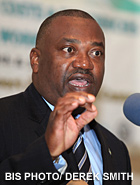| Source: Date: Updated: |
TheBahamasInvestor.com
Wednesday, November 9, 2011 Wednesday, November 9, 2011 |
Nassau, The Bahamas – Investors in small hotels stand to benefit from the profitability of energy efficient architectural design and other environment-friendly practices, according to a recently published report.
Under the Inter-American Development Bank Technical Assistance project, German consulting firm Fichtner conducted a series of audits on the residential, hotel and public sector during 2009/2010, the findings of which were published in the report Promoting Sustainable Energy in The Bahamas.
The Bahamas Hotel Association worked closely with the consultant in identifying 16 hotels in the Family Islands and New Providence varying in size from approximately 50 rooms to more than 350 rooms. Fichtner looked at several indicators on a per rented room basis, such as energy consumption and costs, and electricity consumption and costs.
Speaking at the Bahamas Home & Builders Show at the Nassau Wyndham Resort, Cable Beach earlier in the month, Phenton Neymour, Minister of State for the Environment, said that the Fichtner report suggested solar water heaters in hotel kitchens, more natural shading and ventilation in resort architectural design, and compact fluorescent lamp (CFL) or light-emitting diode (LED) lighting with motion detectors and automatic shut-off timers in high to low traffic areas.
“Research has suggested that the largest electricity savings potentials in The Bahamas exists for small hotels,” said the Minister.
The Bahamas Home & Builders Show was held under the theme: Managing Energy Costs and Efficiencies: A Business Consumer Forum Providing Practical and Proven Solutions to Growing Energy Costs.
During his address, Minister Neymour pointed out that the average cost of energy per hotel room ranged from $20-48 per night in electricity costs. The Fichtner report showed that electricity costs took up about 87 per cent of energy consumption, followed by diesel costs at six per cent and LPG costs at seven per cent.
He said that air conditioning consumed about 50 per cent of the electricity bill, and hot water heating was between 17-45 per cent.
“We must seek to apply our natural and human resources in a way that reduces our vulnerability to price volatility and environmental risks,” he said.
The Ministry of the Environment has been advocating for The Bahamas Electricity Corp (BEC) and the Water and Sewerage Corp to consider other forms of alternative energies that reduces Bahamians’ dependency on fossil fuels.
“The Bahamas is an active participant in the efforts of the US government through its Energy and Climate Partnership of the Americas (ECPA), and is involved in the CARICOM Caribbean Communities efforts to formulate a regional energy policy which, in itself, is a sizeable challenge given the diversity across Caribbean nations,” said Neymour.
“This government realizes that the road to a sustainable and secure energy future will involve both the acquisition of hard technologies such as CFLs, solar water heaters and solar photovoltaic systems and access to emerging technologies, such as the use of Ocean Thermal Energy conversion for district cooling, which is being proposed for the Baha Mar project,” added the Minister.











